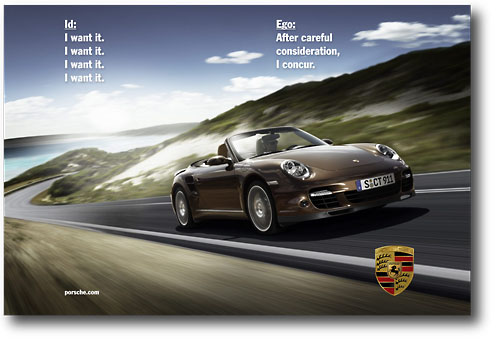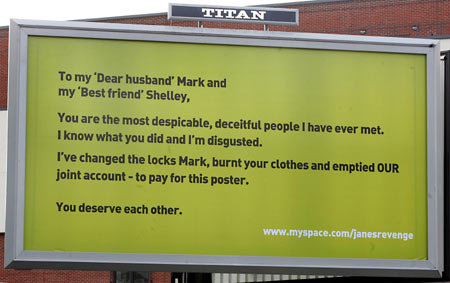Human beings, as intelligent and sophisticated as we like to think we are, are actually highly emotional creatures. Every decision we make is made for emotional reasons. Those are the real reasons. We then back-up those decisions with logical justifications — the “good reasons.”
There was a Porsche ad a few years ago that captured the internal struggle between our emotions and logic with naked perfection:

We do things because we want to — plain and simple. We may talk ourselves into thinking it’s a smart decision, but ultimately, we let our emotions run our lives.
We don’t have to buy the more expensive option. We don’t have to upgrade. You don’t really need premium gas. Logically, there is no reason to spend $400 on athletic shoes (especially when you don’t do anything athletic). No one really needs a $85,000 car when they can get from A to Z perfectly fine in a $15,000 car.
Most Americans almost never choose the least-expensive option (think “generic brand”). Why do we do this?
Because we want to.
“I want, I want, I want.”
We fork over millions of dollars every day because we want to. Not because we need to. Not because we really think it’s smart. Because we just feel like it.

Are You Ready for a Digital Transformation?
Unlock the potential of your financial institution's digital future with Arriba Advisors. Chart a course for growth, value and superior customer experiences.

Why Industry Cloud for Banking?
PwC’s Industry Cloud for Banking helps deliver personalized products and services that today’s customers expect.
As Nike says, “Just do it…”
Reality Check: Marketers are “want makers.”
Good marketing taps people’s emotions — base emotions — the fundamental psychology that drives us. Things like Greed. Fear. Envy. Trust. Love. Spite.
“Spite? People buy stuff out of ‘spite’?” you ask. “You’re joking?”
No joke. Kids make buying decisions to spite their parents. They do it when they’re 15. They do it when they’re 50.
Wives (and ex-wives) buy stuff to get even with their husbands:

Jane’s revenge billboard cost £2,500. But how much does she think it was worth?
Is it rational? No.
Does it make any sense? No.
Does it feel good? Yes.
“Just do it…”
Parents don’t take their kids to McDonald’s for rational reasons. It’s not because McDonald’s is nutritious. It’s not because it’s cheap. Not because “the kids just lovvve it.” Parents take their kids to McDonald’s because it’s easy…on them, the parents. Parents can trust McDonald’s to make their lives a little easier. That’s what makes McDonald’s “convenient,” not the fact that there’s one on every corner.
You’ll notice McDonald’s never runs ads saying they are “fast, affordable, convenient and consistent.” Why? Because McDonald’s is a smart marketer, and smart marketers know you can’t rationalize people into making their decisions.
Unless, of course, you’re willing to make the ultimate marketing rationalization: “We will always be the cheapest.”
Key Takeaways:
- Logical arguments aren’t always effective and “running the math” doesn’t always work.
- People will pay a huge premium when you address their psychological and emotional needs.
- Stop pushing features. Start selling the benefits — just make sure you provide enough rationale for people to justify their decisions.







